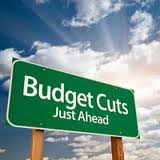 The federal budget sequestration may have kept a lid on escalating federal budget deficits, a good thing, but it was a disaster for Virginia’s economy. The cap on federal spending hammered a Northern Virginia economy built largely around the Pentagon. The ascension of Donald Trump to the presidency signaled a possible return to the region’s glory days as the new president promised to increase defense spending by $50 billion.
The federal budget sequestration may have kept a lid on escalating federal budget deficits, a good thing, but it was a disaster for Virginia’s economy. The cap on federal spending hammered a Northern Virginia economy built largely around the Pentagon. The ascension of Donald Trump to the presidency signaled a possible return to the region’s glory days as the new president promised to increase defense spending by $50 billion.
But the president has created massive uncertainty with a vow to slash discretionary spending in civilian programs and bureaucracies. The Washington Post is all in a dither:
The cuts Trump plans to propose this week are also expected to lead to layoffs among federal workers, changes that would be felt sharply in the Washington area. According to an economic analysis by Mark Zandi, chief economist for Moody’s Analytics, the reductions outlined so far by Trump’s advisers would reduce employment in the region by 1.8 percent and personal income by 3.5 percent, and lower home prices by 1.9 percent. …
Trump’s emphasis on defense spending might provide a buffer for Northern Virginia, although, as noted previously on this blog, there are some within his administration who believe that the Pentagon civilian bureaucracy needs to be whacked down to size in order to free more resources for fighting forces. Under a serious effort to rebuild the U.S. Navy, Hampton Roads’ military bases and shipbuilders could be big beneficiaries.
We can’t say anything with certainty until Trump releases the details of his plans later this week. But at this moment in time, it looks like the new budgetary policies could be a mild plus for Virginia with boosts in defense spending offsetting cuts in other areas. Conversely, Maryland and Washington, D.C., with their large non-military exposure, could be in for a world of hurt
Adding to Washington’s woes…. The metro area’s job performance in 2016 has been revised downward. Reports the Washington Business Journal: “The D.C. region added 55,600 jobs in 2016, according to final data released Tuesday by the Bureau of Labor Statistics — about 16,800 fewer than the agency had initially counted.”
“We are talking slashing and burning several different agencies on the discretionary, non-defense side. That could have a pretty chilling effect for the local economy,” said Clifford Rossi, a professor of the practice at the Robert H. Smith School of Business at the University of Maryland-College Park.
Rossi agreed that the revised job growth numbers reveal an economy that was weaker than it originally appeared, and that the federal spending cuts proposed by Trump could have a compound effect on the regional economy.
Bacon’s bottom line: Actually, the loss of 1.8% employment and 3.5% income is no worse than what dozens of other metros experienced in the last recession. But have compassion! Washington has never been through anything like this before.
(This article first appeared in Bacon’s Rebellion on March 14th, 2017)
 Email this author
Email this author
- The Most Progressive Budget in Virginia’s History - December 21, 2019
- When is a Clean Water Act Permit Needed? - December 21, 2019
- Should U.S. Consider Modern Monetary Theory to Improve Economy? - December 21, 2019
